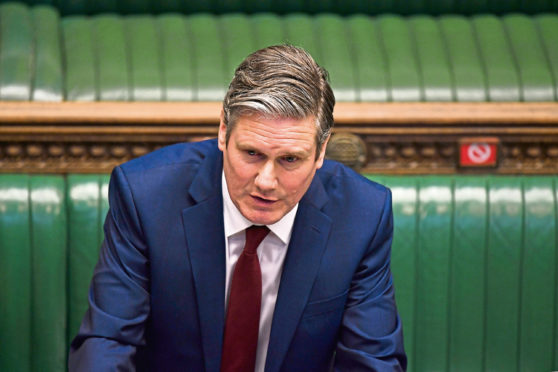That the SNP are turning into Labour circa 2003 is old hat, but at least they are still in power, and look set to remain so. For Labour, the chance of getting back into office in Scotland looks more remote then ever. Labour took Scotland for granted and, but for a recount in Inverness on the night of the 2007 election, might have stayed in office for at least three terms.
The SNP look likely to win the 2021 election, getting a fourth term, but show the same signs of arrogance that did for the “people’s party” more than a decade ago.
The SNP’s great good luck is that they have no rival for power. Where Labour should be snapping at the heels, they can barely move from their torpor – and the problem is constitutional.
Sir Keir Starmer seems a plausible leader. A smart lawyer of centrist views who is good in Parliament.
In firing Rebecca Long Bailey for liking, and then not un-liking, a tweet that hinted at anti-Semitic conspiracy thinking, he did the right thing.
A clear message that the delusional Jeremy Corbyn days are over and Starmer has a firm grip on what it takes to win back voters.
If he’s been mild in his critique of the UK Government’s handling of the virus, that’s because it’s a tricky topic.
Too hard and you appear hostile to all the hard work and sacrifice. Too soft and you come across weak.
Better to endure the crisis and wait for politics to start again properly – assuming they do.
The big mistake is Starmer’s Scotland policy. At the beginning of May, he said: “I also want to have a frank conversation with the Scottish people about what is happening in their communities and how we can restore people’s trust in Labour as a force for good and a force for change.”
Oddly, that frank discussion took place among people who are members of the Labour Party, an ever-diminishing group who but a few months back were campaigning for Corbyn. The people Labour needs to hear from are those who have left the party. Most of all, it needs to target switch voters who moved on to the SNP.
To no one’s surprise, after consulting people who loathe their reduced circumstances and the Nats with equal measure, the party decided to oppose any move to a second indy referendum. A triumph for the people’s party of Scotland, but not the people of Scotland.
Foolishly, Starmer endorsed this policy, telling journalists: “There is nothing between me and Scottish Labour on this. One of the things I am determined to do as leader of the Labour Party is to ensure that the Labour Party across the United Kingdom and in Scotland are all speaking in the same way, on the same issues.”
Labour unity is important, but no good when united around a contradictory policy.
Starmer added: “The argument we have to make is about radical federalism, about putting power closer to people, and I don’t just mean in the Scottish Parliament, I mean beyond that, into local councils, into local communities.”
If you want to give the people power, it makes no sense to deny them a vote.
If you trust the people, then why not their right to choose?
Starmer will not win back Scotland with this policy.
Indeed, Labour will never recover until they can separate the right to choose from the merits of independence.
Starmer said: “Breaking up the United Kingdom when we are about to face an economic crisis, with probably mass unemployment, is the wrong thing to do.”
That may well be true. Indy looks mind-bendingly complex and risky given record levels of national debt and shocked economy.
But that’s not what matters most right now. The issue at stake is not how would Scotland, or indeed England, survive the break-up of the Union, but whether Scots have a right to choose.
The error Starmer has made is not to see the opportunity in another vote.
Another referendum could ask Scots to choose between radical federalism, independence and the status quo.
It is, after all, what Alex Salmond argued for in the run-up to the last referendum.
Those circumstances would give Labour a road to recovery, something fresh to say and a high chance of winning the vote. Importantly, it would be something that allows them to engage in conversation with soft unionists who don’t like Boris Johnson, and nationalists who have grown tired of the SNP’s conservatism. It would appeal to Scottish voters’ mixed sense of social justice and national interest.
Instead, Starmer has opted for a doorstep stinker. Radical federalism would seem to rely on Labour recovering in Scotland, winning back its “red wall” seats in England, then overturning an 80-seat majority in a UK general election some years away, and then delivering on the policy. That is daisy chain politics.
He’d be better advised to shape radical federalism and demand it be put to a vote alongside indy. Until that time, Scottish politics is about the SNP, good and bad.

